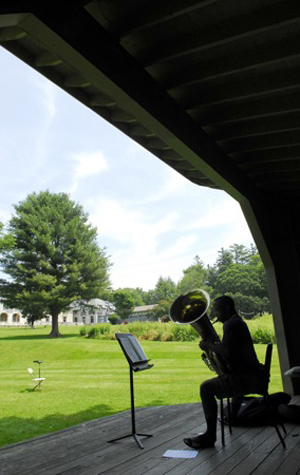Advisory Panel to Weigh Future of Tanglewood Institute
CFA summer program has served high school musicians since 1967

As part of the University’s ongoing review of the quality, cost-effectiveness, and relevance to its core mission of programs in its schools and colleges, a newly formed advisory committee will consider the future of the Boston University Tanglewood Institute (BUTI), a training program for young musicians ages 14 to 20, in Lenox, Mass., the Berkshires summer home of the Boston Symphony Orchestra. Attended by about 340 high school students or high school graduates each summer, BUTI has been a satellite of the College of Fine Arts since 1967, created by Edward Stein, then dean of CFA, as a counterpart to the BSO’s Tanglewood Music Center.
Calling the internationally recognized summer program “a valued activity,” Jean Morrison, University provost, wrote in an October 7 memo to CFA faculty and staff that in light of “increased pressures on scarce resources,” the University needs to constantly assess its priorities. Morrison has asked the ad hoc committee to submit recommendations regarding BUTI’s future to her and to University President Robert A. Brown before December 31, 2013.
Offering a variety of summer programs, BUTI is dedicated to young artists’ immersion in the discipline and pleasures of making advanced-level music in a bucolic setting. Gifted students from around the United States and nearly a dozen foreign countries share housing, a rehearsal hall, and studios, spread across scenic acreage. Expected to practice five or more hours a day, they also benefit from studying in the orbit of the orchestral world’s leading professionals, from the BSO—14 of whose members are BUTI alumni—to visiting performers.
But ongoing support for BUTI relies on “considerable investments by the University in subsidizing facilities, personnel, and infrastructure costs as part of our commitment to maintaining program excellence,” wrote Morrison. She has charged the advisory committee with reviewing all aspects of BUTI’s programs and activities and assessing the institute’s costs and benefits, providing data on student enrollments and placement after completing the program, operating expenses and revenue, contractual obligations and capital investment issues, and gathering “any other relevant information, then consider those in light of CFA’s and the University’s core academic mission.”
Nicole Hawkes, associate provost for strategic initiatives, will chair the nine-member panel. “The committee is charged with looking closely at all of the data around BUTI’s programs and activities to gain a full appreciation of its operational costs and tangible benefits to the School of Music, to CFA, and to the University,” says Hawkes. “The strength of the committee is in the variety of perspectives represented—some members have connections to BUTI and others have important knowledge and expertise that will help us to understand and evaluate the various information under consideration. We aim to develop a thorough understanding of the program and its relationship to BU’s academic mission in order to deliver a thoughtful recommendation on BUTI’s long term future.”
The other committee members are Lynne Allen, director of the School of Visual Arts, John Amend, CFA assistant dean for administration and finance, Michelle Consalvo, assistant vice president for government and community affairs, Richard Cornell, ad interim director of the School of Music, Sharon Daniels, a CFA associate professor of music, opera, and voice, Michael DiFabio, associate vice president, property acquisition, Derek Howe, vice president for budget and capital planning, and David Kopp, a CFA associate professor of music, composition, and theory, and associate director for academic affairs.
“This is not an easy task,” says Morrison. “BUTI has provided important musical experiences for many participants over its nearly 50-year history.”
Comments & Discussion
Boston University moderates comments to facilitate an informed, substantive, civil conversation. Abusive, profane, self-promotional, misleading, incoherent or off-topic comments will be rejected. Moderators are staffed during regular business hours (EST) and can only accept comments written in English. Statistics or facts must include a citation or a link to the citation.